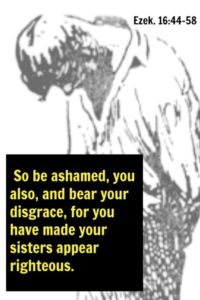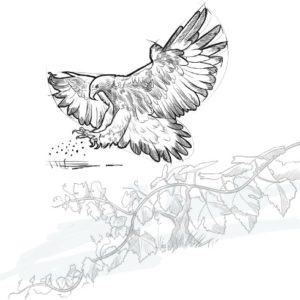NOVEMBER 7- TODAY’S READING FROM THE ONE YEAR BIBLE- Ezekiel 16:42-17:24; Hebrews 8:1-13; Psalm 106:13-31; Proverbs 27:7-9
TODAY’S READING FROM THE OLD TESTAMENT- – Ezekiel 16:42-17:24
Ezekiel is following the Lord’s command to “confront Jerusalem with her detestable practices” (Ezekiel 16:2).
This time he is told to speak a parable. As far as we know, no dramatic action or scenery was required. It is a love story in four acts.
The parable illustrates the underlying reason for God’s impending judgment upon the city of Jerusalem. Israel, the covenant bride of Yahweh, has rejected His love and gone after other lovers (idols), even to the point of soliciting them. He sets forth the conduct of the entire nation in the light of the love of God.
 The parable can be outlined this way:
The parable can be outlined this way:
Act 1- Love Lavished. (Ezekiel 16:1-14). The Tale of Extravagant Grace. A King (a depiction of the Lord God) rescues a child born of an Amorite father and Hittite mother, who has been abandoned at birth. He rescued the newborn child who had not yet been cleansed from the blood that covered her at birth, or severed from the umbilical cord that wrapped around her. She was thrown out into an open field and abandoned. The King has compassion on the child and says to her, “Live!” She grows into a beautiful woman. When she comes of age, he marries her, entering a sacred covenant relationship.
Act 2- Love Scorned (Ezekiel 16:15-34). A Tale of Callous Betrayal. The Queen betrays the King with her infidelity. She pursues a life of prostitution. She is so amorous that she pays her lovers.
Act 3- Love Lost (Ezekiel 16:35-52). A Tale of Dark Disgrace. The Queen, now turned prostitute, is publicly humiliated and judged as an adulteress. Her story would become a ‘proverb’, ‘like mother, like daughter’, as her behavior did not reflect the glory of her husband, but the idolatry of her ancestors, the Hittites and Amorites, who transmitted their wickedness to Sodom, Samaria (referring to the Northern Kingdom) and Jerusalem (referring to the Southern Kingdom). Jerusalem had become the daughter of Samaria. Together they became harlots like the nations that surrounded her, and together they would be punished.
 Judah’s sins were so hideous that her conduct made Sodom and Samaria appear righteous by comparison.
Judah’s sins were so hideous that her conduct made Sodom and Samaria appear righteous by comparison.
Act 4- Love’s Last Surprise (Ezekiel 16:53-56) A Tale of Scandalous Mercy; Sodom and Samaria were bywords for evil, and yet God promises to restore them. The irony is that Judah had now become a byword to its pagan neighbors (v.56-57).
God pledges to restore Judah with her sisters, Sodom and Samaria.
Ezekiel 16:62-63 62 So I will establish my covenant with you, and you will know that I am the LORD. 63 Then, when I make atonement for you for all you have done, you will remember and be ashamed and never again open your mouth because of your humiliation, declares the Sovereign LORD.
 In Chapter 17, the word of the Lord comes to Ezekiel again. This time the Lord gives Ezekiel the parable about a great eagle (Nebuchadnezzar) who had powerful wings (armies) and plumage (an impressive kingdom). It was taking hold of a cedar tree (Judah) and breaking off the top of it (representing Judah’s king Jehoiachin and the nobles). It carried the top branch to a land of merchants (Babylon). It also takes some of the seed of the land (Jehoiachin’s cousin, Zedekiah) and puts it in fertile soil (Nebuchadnezzar makes Jehoiachin’s cousin his vassal as King of Judah). The seed (Zedekiah) grows into a lowly vine (rather than a mighty cedar). The vine flourishes as long as it is subject to the eagle. However, there is another eagle with powerful wings and impressive plumage (Egypt- Ezekiel 17:7). The vine stretches forth its branches to him for water. Will it thrive? No. The Lord predicts that it will be uprooted and stripped of its fruit so that it withers.
In Chapter 17, the word of the Lord comes to Ezekiel again. This time the Lord gives Ezekiel the parable about a great eagle (Nebuchadnezzar) who had powerful wings (armies) and plumage (an impressive kingdom). It was taking hold of a cedar tree (Judah) and breaking off the top of it (representing Judah’s king Jehoiachin and the nobles). It carried the top branch to a land of merchants (Babylon). It also takes some of the seed of the land (Jehoiachin’s cousin, Zedekiah) and puts it in fertile soil (Nebuchadnezzar makes Jehoiachin’s cousin his vassal as King of Judah). The seed (Zedekiah) grows into a lowly vine (rather than a mighty cedar). The vine flourishes as long as it is subject to the eagle. However, there is another eagle with powerful wings and impressive plumage (Egypt- Ezekiel 17:7). The vine stretches forth its branches to him for water. Will it thrive? No. The Lord predicts that it will be uprooted and stripped of its fruit so that it withers.
 The stretching forth of the vine to get water from the second eagle is a picture of Zedekiah rebelling against Nebuchadnezzar and sending forth his envoys to Egypt to get help in his stand against the Babylonians. This rebellion will fail, and Zedekiah will die in Babylon.
The stretching forth of the vine to get water from the second eagle is a picture of Zedekiah rebelling against Nebuchadnezzar and sending forth his envoys to Egypt to get help in his stand against the Babylonians. This rebellion will fail, and Zedekiah will die in Babylon.
All these events are part of God’s ‘net’ that He is spreading to catch His people who have broken His covenant and bring them to judgment in Babylon.
 But the parable does not end there. A happy ending is predicted. A remnant of God’s people will be restored, and furthermore, they will be planted on a much higher elevation, a lofty mountain, representing the Kingdom of the Messiah. This tree will flourish and provide shelter for birds of all kinds (every nation).
But the parable does not end there. A happy ending is predicted. A remnant of God’s people will be restored, and furthermore, they will be planted on a much higher elevation, a lofty mountain, representing the Kingdom of the Messiah. This tree will flourish and provide shelter for birds of all kinds (every nation).
Ezekiel 17:22 22 Thus says the Lord GOD, “I will also take a sprig from the lofty top of the cedar and set it out; I will pluck from the topmost of its young twigs a tender one and I will plant it on a high and lofty mountain.”
Ezekiel 17:24 24 “All the trees of the field will know that I am the LORD; I bring down the high tree, exalt the low tree, dry up the green tree and make the dry tree flourish. I am the LORD; I have spoken, and I will perform it.”
TODAY’S READING FROM THE NEW TESTAMENT – Hebrews 8:1-13
 The writer of Hebrews is bringing together the major promises of the Old Testament pertaining to the Coming Messiah as a Royal High Priest ‘after the order of Melchizedek’ and the promise of ‘a new covenant’. These are promises of ‘a better priesthood’, and ‘a better covenant’ based on a ‘better sacrifice’.
The writer of Hebrews is bringing together the major promises of the Old Testament pertaining to the Coming Messiah as a Royal High Priest ‘after the order of Melchizedek’ and the promise of ‘a new covenant’. These are promises of ‘a better priesthood’, and ‘a better covenant’ based on a ‘better sacrifice’.
We have seen how Jesus fulfills the prophecies of the Messiah, the promise of a greater Son of David who will reign as both King and Priest in Psalm 110:1-4, and that this Royal Priest would have a better priesthood than that of Aaron. It would be an unalterable, indestructible, indissoluble, unfailing priesthood, guaranteed with the reinforcement of a Divine Oath and lasting forever! And His offering would be all-sufficient. It was a once and for all sacrifice.
Hebrews 8 begins with a picture of the throne room of heaven with this Royal Priest seated at the right hand of God. This Divine Reality of the Perfect Rule of God (the throne) and the Perfect Mediation of Christ as the Perfect Priest is being communicated in human language with terms we can understand. When human characteristics are used linguistically to help us apprehend something of God, it is called an anthropomorphism. Jesus ‘at the right hand’ of the Majesty on high is an anthropomorphic picture of the place of highest honor. The expression’ right hand’ has come to mean ‘trusted’ or ‘given prominence’, (although there are a great many in the human population who give the left-hand prominence). Jesus, the second person of the Trinity, is exalted with honor to the right hand of God because He perfectly accomplishes the work of satisfying the demands of God’s holy justice on behalf of the penitent believer.
We see how the earthly tabernacle in the wilderness was built according to the pattern God gave Moses (Exodus 25:9,40; 1 Chronicles 28:19). This is because the tabernacle is a prophetic picture of the reality of the redemption that would be accomplished by ‘The Royal Priest to Come’, Jesus, the Messiah (the Christ).
Now, in verse 6, the writer shows how the ministry of this perfect Royal Priest fulfills the promises of the New Covenant. (He will take this up in Chapter 10 in a big way.) This covenant has a superior priestly service, superior mediator, and superior promises.
The writer makes the logical point: Why would God give the promise of a new covenant (Jeremiah 31:31) if the sacrifices of the Old Covenant were in themselves sufficient to reconcile sinners to Himself? The implication is that the first covenant is not adequate in itself. It is just a shadow or a pattern prefiguring what was needed and what was to come.
The inadequacy of the first covenant was not in its promises. Its inadequacy was that it could not empower the people to keep the promises. The Law was not the problem. It revealed the problem. Man’s sinfulness is the problem. Israel did not remain faithful to the covenant.
Romans 7:12 12 So then, the Law is holy, and the commandment is holy and righteous and good.
Romans 7:16 16 But if I do the very thing I do not want to do, I agree with the Law, confessing that the Law is good.
Whereas Israel failed, Jesus succeeded. And He did so on our behalf. And He will continue to do so on our behalf if we abide (rest our faith) in Him.
The New Covenant promises from Jeremiah 31:31-34 are quoted here in Hebrews 8:8-12 and again in Hebrews 10:15-17. In the latter case, it is interesting to note that the giving of this new covenant promise is attributed to the Holy Spirit. (i.e., the Holy Spirit is God)
Hebrews 10:15-17 15 And the Holy Spirit also testifies to us; for after saying, 16 “THIS IS THE COVENANT THAT I WILL MAKE WITH THEM AFTER THOSE DAYS, SAYS THE LORD: I WILL PUT MY LAWS UPON THEIR HEART, AND ON THEIR MIND I WILL WRITE THEM,” He then says, 17 “AND THEIR SINS AND THEIR LAWLESS DEEDS I WILL REMEMBER NO MORE.”
In the New Covenant, the Law Giver becomes the Law Keeper, ruling the heart of the believer. The Holy Spirit mediates the truth and life of Christ to the believer.
Notice the better promises.
- “I will put my laws upon their heart.” That which was a command in the first covenant: “Thou shalt” and “Thou shalt not!”, becomes a promise, “Thou shalt”; “Thou shalt not,” because the Law of the Spirit of Life in Christ Jesus is transforming your heart and conforming you to the image of Christ by His power. “I can do all things through Him who strengthens me” (Phil 4:13).
- “I will be their God, and they will be my people”. He promises a personal relationship in which we belong to Him (See Romans 8:9).
- “All will know me”. An intuitive knowledge of God (not just knowledge about God) will be imparted to all people from every walk of life and all nations, neighbors, as well as brothers, through the indwelling Holy Spirit who illuminates the Word of God to our understanding.
- “For I will forgive their wickedness and remember their sins no more.” The reconciliation will be based upon the perfect propitiation of Christ’s offering on the cross, in which the wrath of God was removed from the sinner, and the righteousness of God was imputed to him “in Christ Jesus”.
TODAY’S READING FROM THE BOOK OF PSALMS- Psalm 106:13-31
God’s holiness is vindicated as the Psalmist recounts the history of Israel and the various means through which God disciplined His people as they went astray.
Notice the repetition of the phrase, “They forgot” (Psalm 106:13; 21). After “they forgot”, “they despised” God’s gifts (v.24), “they grumbled” (v.25), and “they yoked themselves to idols” (v.28).
“They provoked the Lord to anger” resulting in a plague, but Phineas’ stood up’ aligning himself with the Lord by faith, and stopped the plague.
Psalm 106:31 31 And it was reckoned to him for righteousness, To all generations forever.
We often think of Abraham in regard to this promise:
Genesis 15:6 6 Then he believed in the LORD; and He reckoned it to him as righteousness.
But this heritage of justification is given to all who believe God’s self-revelation, giving evidence of their faith in Him by their obedience to Him.
Through faith, Abel obtained the testimony that he was righteous (Hebrews 11:4). Noah, Abraham, even his nephew Lot, are explicitly declared righteous (2 Peter 2:7) because they believed God’s promise.
What about you? Have you obtained the testimony that God has counted you righteous? (2 Corinthians 5:21; 1 Corinthians 1:30)
TODAY’S READING FROM THE BOOK OF PROVERBS – Proverbs 27:7-9
Proverbs 27:7-9 7 A sated man loathes honey, But to a famished man any bitter thing is sweet. 8 Like a bird that wanders from her nest, So is a man who wanders from his home. 9 Oil and perfume make the heart glad, So a man’s counsel is sweet to his friend.
A person who has had their natural desires fully satisfied easily gets bored with what once brought pleasure, even to the point of loathing. However, a person who recognizes their genuine need appreciates whatever will bring nourishment to the body or soul, bitter or sweet. A bird who wanders from her nest loses her place in the scheme of things. The same is true if a person neglects their domestic responsibilities. Oil and perfume can personally lift a person from the effect of the natural fatigue and sweat of life under the sun. Likewise, a friend’s counsel can bring sweetness to one’s life by consistently providing encouragement and wisdom.
PRAY FOR THE NATIONS –
St Pierre & Miquelon
Territorial Collectivity of St. Pierre and Miquelon
North America
Geography
Area: 242 sq. km
An island group at the mouth of Canada’s Gulf of St Lawrence, 25 km south of Newfoundland.
Population: 6,044 Annual Growth: -0.34%
Capital: St Pierre
Urbanites: 90.6%
Peoples
Official language: French Languages: 3 All languages
Religion
Largest Religion: Christian
|
Religion |
|
Pop % |
Ann Gr |
|
5,859 |
96.94 |
-0.6 |
|
|
3 |
0.0 |
0.0 |
Challenges for Prayer
These isolated islands and their people have long been Catholic. Traditions are strong, and change has come slowly, despite the economic downturn when the fishing industry all but disappeared. Pray for people to find hope in a living relationship with Christ.
PRAYER: Lord God, if You should mark our transgressions, none of us could stand. We thank You. Lord Jesus, for paying our sin debt in full that Your righteousness would be satisfied, and Your wrath turned away. Help us to realize the enormity of Your grace and be quick to forgive as fully as we have been forgiven. Thank You for Your indwelling presence, Christ within as our certain hope of glory. May we freely give as we have freely received. In Jesus’ Name. Amen.
